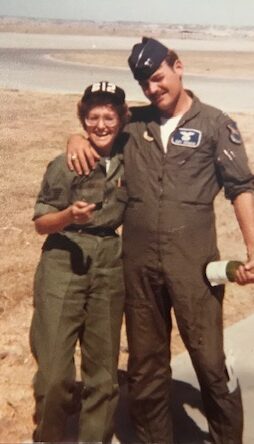When I got married to an officer in the U.S. Air Force — I was enlisted personnel — I don’t know how many times I was asked, “Do you have to salute him in bed?”
No. But if I met him anywhere on base, I did.
You might think that’s funny, but for many dual-military couples it’s a way of life.
More than 7 percent of active-duty members and about 2.6 percent of Guard and Reserve members are in “dual-military” marriages, according TheMilitaryWallet.com. I didn’t find any statistics on retired members of military marriages — our situation — but I’ve got to believe it’s growing.
My husband, Guy, and I got married overseas when the idea of “dualies” was kind of new to the service. When I joined the Air Force, there were not a lot of women in the service, so being married wasn’t that prevalent. I never thought I would find the love of my life working in the squadron next to me. And that he would be an officer.
The road to our eventual marriage was rocky: technically, we weren’t allowed to date. One or both halves of a couple, depending on whether they were different ranks, could be accused of fraternization. There were strict rules against that. In fact, it could end up with one or both being court martialed.
Once we were married it wasn’t “okay” with the military hierarchy, but it was mostly accepted. When it was time to move on to other assignments, we had to apply for joint spouse military moves. This could be hard for those who had different career paths. We were lucky. Since he was a pilot and I was an operations specialist, we could be assigned to the same places.
When I got pregnant with our first child, the Air Force offered me a way out and I took it. For me, it was the right thing to do. I gave up my nine-plus year career — including becoming the first woman helicopter mechanic in the Tactical Air Command and the second in the Air Force — and became a stay-at-home mother. This allowed me to go back to school with my G.I. bill, get my degree and eventually work as a writer, something I am definitely happier and better at doing.
My sister, Janet Ebert, took another path. She was married to another service member and then wasn’t. Her career was flourishing, and when she got a divorce, she didn’t want to get out of the Marine Corps.
She became a single parent who had to have a power-of-attorney in case something happened to her, and she also had to assign care of her daughter to a family member or friend if she had to work somewhere other than the base or post she was assigned to. This “temporary duty elsewhere” (TDY in the Air Force, TAD in the Marines) could be short, a couple of days, or it could be months or even a year. At one point, I was assigned care of her daughter, but it was never needed. She was a single parent for 16 years.
Janet retired after 28 and a half years as a Chief Warrant Officer 5, the first Marine in her career field to achieve that rank. She later married another service member who was a CWO.
One advantage of being dual-military was the references. We both knew the lingo (the military is loaded with it):1500 was 3 p.m. and “Taps” signaled the end of the day.
Another was having two paychecks. Young enlisted people aren’t usually overpaid
A big disadvantage is the possibility of having a job that didn’t match your spouse’s career field.
According to Themilitarywallet.com, “If two servicemembers belong to different career fields, it might not always be possible for them to be assigned to the same location. While efforts are made, whenever feasible, to collocate families it is not a guarantee and is considered a ‘good deal.’”
As members of the military, we had the same goal — to defend and protect our country and its citizens — whether it was abroad or at home. Guy and I spent time in Europe and England, Janet in the Far East. Our shared experiences led to a love of food, the people of those countries and that life. But truly, it was always good to come home.
Beth Bower is a freelance, writer, editor and oookbook author. Guy Bower has hosted The Good Life radio show for more than 30 years.








